I'm sure I have several such flaws, but today I'm going to talk about just one of them. I take board games very seriously. Too seriously, apparently, according to everyone who's ever sat at a table with me, antsy and impatient, asking "Can't we just play??" while I insisted on skimming through all the rules to know the proper modes of play.
It's not that I'm against ever breaking any rule or modifying the rules to make the game more interesting (it was me, after all, who wanted to try a game of Boggle using only slang and phonetic spellings); I just want to make sure we're all clear on what those modified rules are before we commence play. It simplifies things later when the inevitable arguments and bargaining ensue.
What annoys me far more than wanton disregard for the rules is when people play both sides. (That's right, Lisa, I'm lookin' at YOU...) If you're on my team, I don't want you helping my opponents by shouting out clues, and if you're playing opposite me, I don't need your team telling me it's a pity win or a cheater's victory if I come out ahead in the end. Does the degree to which this infuriates me mean I take the game too seriously? Maybe. Would it really be so bad just to let someone have an extra, potentially undeserved point? Probably not. But there are very few things I get particularly worked up about, so I'd like to think the people who love me could simply let this one thing slide.
So far I've yet to find the man who finds my competitive streak endearing. My last boyfriend, on the way back to my place after a particularly feisty game of Catchphrase with some friends, actually felt the need to mention, "You know, you get really competitive when you play board games." I don't know what Captain Obvious thought I might like to do with that little insight, but I really didn't need or appreciate the observation.
That was the night I apparently proved myself an insensitive and condescending friend for reveling a bit in what I considered good natured and well-deserved ribbing towards a friend who had what I felt was a pretty amusing episode of brain lapse.
Her word was "porpoise," but all the clues she gave her team were distinctively turtle-related. "It's got a shell, and four legs, and it lives in the ocean... some of them get really big... the little ones snap at you..."
As expected, her teammates kept shouting out various types of turtles, and she simply couldn't understand why they weren't translating her clues into a proper answer. When the turn was over and she revealed the word, I expected she would slap her head in an "Agh! Stupid me!" moment as we pointed out that a porpoise was, of course, an animal similar to a dolphin, and that the turtle clues she was giving would relate more accurately to a tortoise. It was a simple and honest mistake, and one that I thought was grounds for a "we're laughing with you, not at you" type reaction. Instead, I was chastised and berated for making my good friend feel bad or implying she was stupid. I maintain that her mistake was just as egregious as my having no clue who John McEnroe was (a lapse for which everyone felt free to mock me incredulously), but apparently knowledge of sports figures ranks higher on the cultural literacy scale than basic familiarity with the animal kingdom. Clearly I had no idea.
Catchphrase is a fun game because it's one where everyone has a relatively equal chance of succeeding. Sure, there's maybe some skill or strategy involved in knowing how to give a proper clue and feeling comfortable under pressure, but the cards themselves aren't particularly biased towards or against any specific area of expertise. It would be hard to prove that freakishly focused knowledge of any one subject really lends much advantage throughout the game as a whole. This is unlike Trivial Pursuit, of course, where the Sports & Leisure category serves as a crutch to some and an albatross to others. In Catchphrase, your robot recollection of every quarterback in the NFL is only as good as the team members who can name that player, and even if it works in your favor, you may not get another chance to pull a highlight from your database for the whole rest of the game.
A similar game my friends and I recently discovered is The Name Game. The rules of The Name Game are pretty simple. Each card contains a name, and your task is to get your team members to say that name through your clever and helpful clues. The usual rules apply--no "starts with" letter clues, no clues that use the actual name or word your teammates are trying to guess... The rules about "sounds like" clues are kind of fun... no direct rhyming is allowed, but indirect rhyming is OK. For example, if your card says Lorena Bobbit, you can't say "her last name rhymes with Hobbit," but it's completely acceptable (in fact, encouraged) to say "her last name rhymes with the furry-footed little people from the Lord of the Rings trilogy." Of course, in this particular example, you could probably cut to the chase (heh; no pun intended) with a more direct and specific clue to Lorena's identify, but surely you get my point.
An inevitable stumbling block in The Name Game is the occasional mystery person who you've never heard of and therefore have no idea whatsoever how to describe to your team. Since passing on cards is not allowed, your stammering and frustration can quickly wile away all the allotted time for your turn. As you gain more practice with The Name Game, however, you become slightly less daunted by the unfamiliar names you draw from the deck. Your first reaction might be "Who the hell...?" but you quickly gain composure and realize you can simply break the name down into two or more easy-to-guess parts, and then lead your teammates to assemble those parts in a way reminiscent of the two-headed monster sounding things out behind the brick wall on Sesame Street. It doesn't matter if your team knows what they just said; as long as they said it, the point is yours.
I didn't immediately learn this trick, however, so the first time I played The Name Game, I was frustratingly thwarted more than once. The most memorable (to me and probably everyone else at the table, due to the rant that ensued after my turn) was Bret Easton Ellis. As apparently everyone except the five people at my friend's kitchen table in Rochester that night knows, Bret Easton Ellis is the author of the notorious 1980s novel Less Than Zero, as well as several other well-known books, including American Psycho and The Rules of Attraction (all of which were made into movies, two of which I've actually seen). At the time, I didn't know this, however. And since I wasn't yet skilled enough in The Name Game to think of other ways to convey this three-part mystery name, I quickly blew my whole turn agonizing over who on earth Bret Easton Ellis could be. Sure, looking back, I could easily have revealed Bret's first name just by asking for the name of the Green Bay Packers quarterback; "Ellis" could quickly have been deciphered with some clue about where immigrants to the US traditionally arrived; and "Easton" could maybe have been reached through some clue about directional orientation or maybe "the opposite of 'Westin' hotels..." I didn't think of this at the time, however, so Bret Easton Ellis became my most memorably frustrating Name Game clue yet.
At the time, I took some small comfort in the fact that Mr. Ellis's name was unfamiliar to everyone else at the table as well. Five reasonably intelligent, well-read adults with college degrees, yet none of us could identify Bret Easton Ellis without a trip to Google or Amazon.com.
Now, of course, I will never forget Ellis's name. He is destined to haunt me, the same way the word "pejorative" did after serving as my ousting ticket at the regional spelling bee in sixth grade. My mother and I looked up the then-foreign word that night, and I never heard it again... at least, not for six or seven years. Then I went to college, where my freshman year Intro to Lit. professor suddenly followed some statement made in class with, "I don't mean that in a pejorative sense..." My ears perked up immediately, as they later did on countless other occasions where professors felt compelled to use that word. Perhaps it was on a word-a-day calendar that the Dean of Arts & Sciences gave to every instructor; I can't provide any other explanation for the sudden prevalence in Hibbard Hall of an otherwise not-too-common word.
Bret Easton Ellis is quickly surfacing in my consciousness in much the same fashion. He's recently published a new novel (Lunar Park), and it's as though the whole of the Internet community is seeking to taunt me for my ignorance of his identity. As if she knows me personally and wants nothing more than to rub my face in my own stupidity, The Old Hag recently wrote...
Bret Easton Ellis needs no introduction. Not because his first novel, Less Than Zero, was a "zeitgeist touchstone," or because he has been profiled in "every magazine and newspaper that existed," or because his name is as "recognizable as most movie stars' or athletes'..."As recognizable as most movie stars or athletes, eh? Well, my friend the sports computer can name every pitcher in Major League history, and my friend the movie buff can identify nearly every face in US Weekly, but none of us knew Bret Easton Ellis until some stupid game (and my clearly irrational reaction to it) prompted some research.
I had just about gotten over this jab to my literary awareness when I opened my Web browser this morning to see the following lead-in to Salon's cover story for the day:
Savor the end of summer with the season's best novels, including the latest from Cormac McCarthy, Kathryn Harrison, Kelly Link, Bret Easton Ellis and more.OK, I get it. I'm not as smart as I thought I was. Someone should revoke my English degree. All right.
Or maybe I should, as has been suggested more than once, just stop taking board games so damn seriously.

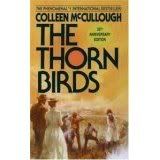
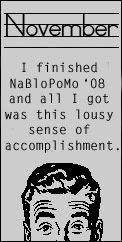
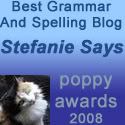
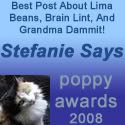

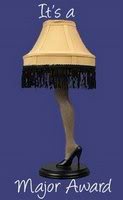
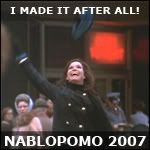



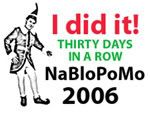

No comments:
Post a Comment